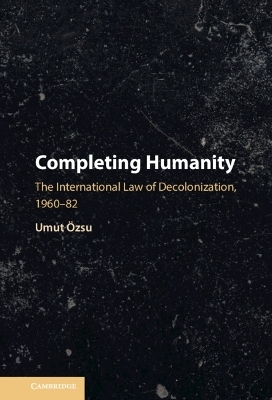
Completing Humanity
The International Law of Decolonization, 1960–82
Seiten
2023
Cambridge University Press (Verlag)
978-1-108-42769-2 (ISBN)
Cambridge University Press (Verlag)
978-1-108-42769-2 (ISBN)
Umut Özsu recounts the history of the struggle to decolonize international law, commencing with the General Assembly's landmark 1960 decolonization resolution and concluding in 1982, with the close of the third UN Conference on the Law of the Sea and the onset of the Latin American debt crisis.
After the Second World War, the dissolution of European empires and emergence of 'new states' in Asia, Africa, Oceania, and elsewhere necessitated large-scale structural changes in international legal order. In Completing Humanity, Umut Özsu recounts the history of the struggle to transform international law during the twentieth century's last major wave of decolonization. Commencing in 1960, with the General Assembly's landmark decolonization resolution, and concluding in 1982, with the close of the third UN Conference on the Law of the Sea and the onset of the Latin American debt crisis, the book examines the work of elite international lawyers from newly independent states alongside that of international law specialists from 'First World' and socialist states. A study in modifications to legal theory and doctrine over time, it documents and reassesses post-1945 decolonization from the standpoint of the 'Third World' and the jurists who elaborated and defended its interests.
After the Second World War, the dissolution of European empires and emergence of 'new states' in Asia, Africa, Oceania, and elsewhere necessitated large-scale structural changes in international legal order. In Completing Humanity, Umut Özsu recounts the history of the struggle to transform international law during the twentieth century's last major wave of decolonization. Commencing in 1960, with the General Assembly's landmark decolonization resolution, and concluding in 1982, with the close of the third UN Conference on the Law of the Sea and the onset of the Latin American debt crisis, the book examines the work of elite international lawyers from newly independent states alongside that of international law specialists from 'First World' and socialist states. A study in modifications to legal theory and doctrine over time, it documents and reassesses post-1945 decolonization from the standpoint of the 'Third World' and the jurists who elaborated and defended its interests.
Umut Özsu is Associate Professor of Law and Legal Studies at Carleton University. He is the author of Formalizing Displacement: International Law and Population Transfers (2015), and the co-editor of several volumes and journal symposia.
Introduction; 1. Fixing Selves; 2. Forging Universals; 3. Redistributing Resources; 4. Pooling Rights; 5. Righting Markets; Conclusion; Bibliography; Index.
| Erscheinungsdatum | 12.12.2023 |
|---|---|
| Zusatzinfo | Worked examples or Exercises |
| Verlagsort | Cambridge |
| Sprache | englisch |
| Themenwelt | Recht / Steuern ► EU / Internationales Recht |
| Sozialwissenschaften ► Politik / Verwaltung ► Europäische / Internationale Politik | |
| ISBN-10 | 1-108-42769-3 / 1108427693 |
| ISBN-13 | 978-1-108-42769-2 / 9781108427692 |
| Zustand | Neuware |
| Haben Sie eine Frage zum Produkt? |
Mehr entdecken
aus dem Bereich
aus dem Bereich
Studienbuch
Buch | Hardcover (2023)
De Gruyter Oldenbourg (Verlag)
CHF 62,90
erfolgreiche Interessenvertretung durch Prozesskompetenz im komplexen …
Buch | Hardcover (2023)
Wiley-VCH (Verlag)
CHF 58,75


